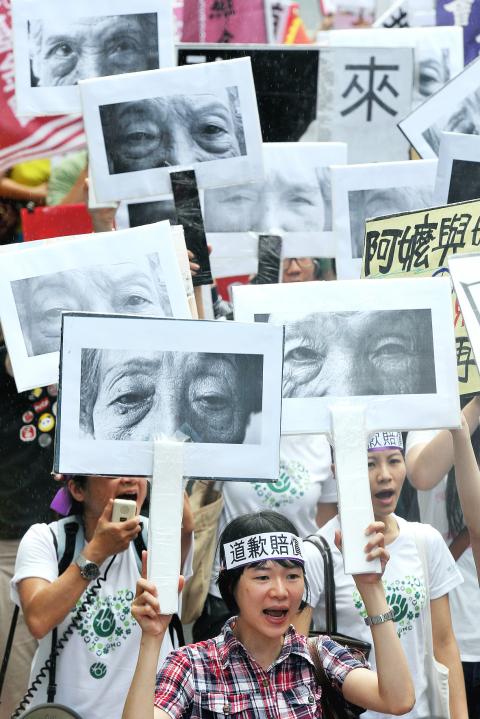On the 67th anniversary of Japan’s surrender to the Allies, ending World War II, more than 100 people demonstrated outside the Interchange Association, Japan, in Taipei yesterday, urging Japan to apologize for forcing Taiwanese women to serve as “comfort women” during the war.
Holding placards demanding that the Japanese government apologize for using comfort women, photographs of Taiwanese comfort women and five wheelchairs that represent former comfort women who were unable to attend the demonstration, more than 100 demonstrators chanted slogans as they marched from Zhongxiao E Road to Japan’s representative office in Taiwan, located on Qingcheng Street.
“It’s been 20 years since former Taiwanese comfort women started their campaign to demand an apology from the Japanese government. At the time, there were 58 former comfort women, but now, only nine are still alive,” Taipei City Women’s Rescue Foundation executive director Kang Shu-hua (康淑華) said. “How long do they have to wait for justice to be served? Will they really see justice in their lifetimes?”

Photo: Chien Jung-feng, Taipei Times
Kang said that while some former comfort women had taken part in demonstrations in past years, none were able to attend this year because their health was too fragile.
Taiwan Solidarity Union Legislator Lin Shih-chia (林世嘉) and Democratic Progressive Party Legislator Wu Yi-chen (吳宜臻) also took part in the demonstration.
“It isn’t shameful to recognize the mistakes of the past,” Lin said. “The former comfort women are now in their 80s or 90s. Their youth was destroyed by you [Japan], they deserve a formal apology from you.”
Wu accused the government of not helping former comfort women.
“President Ma Ying-jeou [馬英九] met with former comfort women in June and heard their call for help. Why hasn’t he said anything yet?” Wu asked. “We demand that the government defend the rights of Taiwanese nationals.”
Masahiko Sugita, Economic Affairs Director of the Japanese representative office, accepted a letter of complaint from the demonstrators and promised to forward the letter to the appropriate party.
When Sugita stepped out of the office, the crowd started to shout “apologize.” As Sugita returned into the office with the letter without responding to the crowd, they tore up small Japanese military flags.

Taiwan has received more than US$70 million in royalties as of the end of last year from developing the F-16V jet as countries worldwide purchase or upgrade to this popular model, government and military officials said on Saturday. Taiwan funded the development of the F-16V jet and ended up the sole investor as other countries withdrew from the program. Now the F-16V is increasingly popular and countries must pay Taiwan a percentage in royalties when they purchase new F-16V aircraft or upgrade older F-16 models. The next five years are expected to be the peak for these royalties, with Taiwan potentially earning

STAY IN YOUR LANE: As the US and Israel attack Iran, the ministry has warned China not to overstep by including Taiwanese citizens in its evacuation orders The Ministry of Foreign Affairs (MOFA) yesterday rebuked a statement by China’s embassy in Israel that it would evacuate Taiwanese holders of Chinese travel documents from Israel amid the latter’s escalating conflict with Iran. Tensions have risen across the Middle East in the wake of US and Israeli airstrikes on Iran beginning Saturday. China subsequently issued an evacuation notice for its citizens. In a news release, the Chinese embassy in Israel said holders of “Taiwan compatriot permits (台胞證)” issued to Taiwanese nationals by Chinese authorities for travel to China — could register for evacuation to Egypt. In Taipei, the ministry yesterday said Taiwan

Taiwan is awaiting official notification from the US regarding the status of the Agreement on Reciprocal Trade (ART) after the US Supreme Court ruled US President Donald Trump's global tariffs unconstitutional. Speaking to reporters before a legislative hearing today, Premier Cho Jung-tai (卓榮泰) said that Taiwan's negotiation team remains focused on ensuring that the bilateral trade deal remains intact despite the legal challenge to Trump's tariff policy. "The US has pledged to notify its trade partners once the subsequent administrative and legal processes are finalized, and that certainly includes Taiwan," Cho said when asked about opposition parties’ doubts that the ART was

If China chose to invade Taiwan tomorrow, it would only have to sever three undersea fiber-optic cable clusters to cause a data blackout, Jason Hsu (許毓仁), a senior fellow at the Hudson Institute and former Chinese Nationalist Party (KMT) legislator, told a US security panel yesterday. In a Taiwan contingency, cable disruption would be one of the earliest preinvasion actions and the signal that escalation had begun, he said, adding that Taiwan’s current cable repair capabilities are insufficient. The US-China Economic and Security Review Commission (USCC) yesterday held a hearing on US-China Competition Under the Sea, with Hsu speaking on